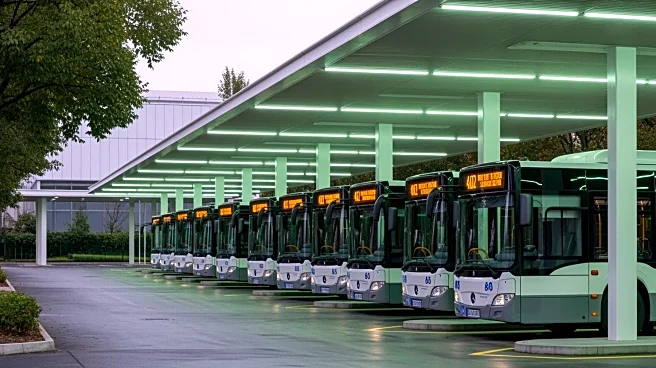What's Happening?
Iveco Bus is set to deliver 17 Bus 17-210 G chassis powered by natural gas and biomethane to the city of Paraná, Entre Ríos, Argentina. This delivery is part of a larger order of 77 vehicles aimed at modernizing
the city's urban transport network. The sale was completed with Transporte San José, the operator awarded the public tender for urban transport services, in collaboration with Overbus, the official Iveco Bus dealer in Argentina, and Italbus, a local bodybuilder. The 17-210 G models are the first of their kind to be integrated into Paraná's urban transport fleet, offering a sustainable mobility solution with reduced pollutant emissions and accessibility features for people with reduced mobility.
Why It's Important?
The introduction of natural gas and biomethane-powered buses in Paraná represents a significant step towards sustainable urban transport in Latin America. By leveraging the local availability of natural gas, these buses offer a viable alternative to traditional diesel-powered vehicles, with comparable operating costs. This move aligns with broader efforts to decarbonize urban transport and reduce environmental impact. The widespread availability of natural gas and the development of supporting infrastructure in the region further enhance the feasibility of this transition. Stakeholders in the transport sector, including city planners and environmental advocates, stand to benefit from the reduced emissions and improved air quality associated with this initiative.
What's Next?
As the natural gas and biomethane-powered buses are integrated into Paraná's transport network, monitoring their performance and impact on urban mobility will be crucial. The success of this initiative could encourage other cities in Latin America to adopt similar sustainable transport solutions. Additionally, continued investment in natural gas infrastructure and technology development will be essential to support the broader transition to decarbonized urban transport. Stakeholders, including government agencies and transport operators, may explore further collaborations to expand the use of alternative fuel vehicles across the region.
Beyond the Headlines
The shift towards natural gas and biomethane-powered buses in Paraná highlights the growing importance of sustainable mobility solutions in urban planning. This development could influence policy decisions and encourage investment in renewable energy sources and infrastructure. The initiative also underscores the potential for public-private partnerships in advancing environmental goals, as seen in the collaboration between Iveco Bus, local dealers, and transport operators. As cities worldwide grapple with the challenges of climate change and urbanization, the success of such projects could serve as a model for integrating sustainability into public transport systems.









